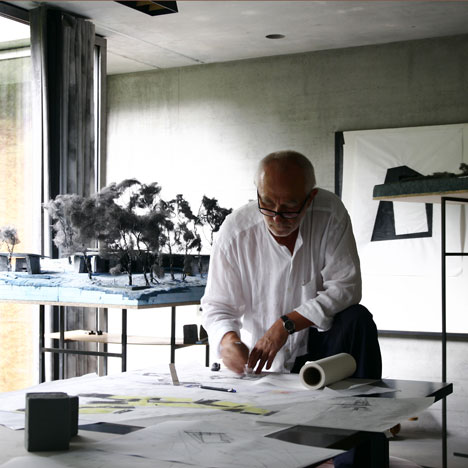News: Swiss architect Peter Zumthor rejected architecture as form-making in his Royal Gold Medal lecture at the RIBA in London yesterday, explaining that he believes that light, materials and atmosphere are the most important aspects of architecture.
"Architecture is not about form, it is about many other things," he said. "The light and the use, and the structure, and the shadow, the smell and so on. I think form is the easiest to control, it can be done at the end."
Zumthor, who is best known for designing material-led projects such as the Therme Vals thermal baths in Switzerland and the Kunsthaus Bregenz gallery in Austria, told an audience that his ultimate goal is to "create emotional space". He insisted that the "condensation of emotion" can be created in any building, from a humble railway station in Berlin to a house in countryside. "For me, they should all have atmosphere," he said.
Above: Thermal Bath Vals, photographed by Hélène Binet
This notion of a "presence in architecture" provided the subject of the lecture, as Zumthor described his quest to find an architecture that is free from symbolism and all about experience.
Reflecting on a childhood recollection of running through a village in springtime, he said: "This is my first memory of something which I think was pure presence, with no meaning and no history." He then discussed how these ideas influenced the design of projects such as the Steilneset Memorial, a tribute to suspected witches who were burned at the stake. "Meaning of course can never be avoided," he said, "but I like to work as long as possible on use and structure and materials, to avoid premature meaning."
Above: Steilneset Memorial, photographed by Andrew Meredith
The architect recalled how he once asked students to design a house without form, while his latest project is a holiday retreat with rammed concrete walls, intended as a haven of calm and reflection. "It's about creating emotional space," he added. "If I can do that, if I can create a space which is just right for its purpose and for its place, I think that is the greatest achievement. That's my goal."
In a question and answer section, Zumthor described himself as more of an isolated artist than an architect; someone who is not inspired by other architecture but instead tries to do everything without precedent. "I start from scratch, I guess I work more like an artist," he explained. "I'm not a typological architect, I'm more of an architect of place. I always start completely anew."
But with this emotional and personal approach to architecture, how does he find the right team of architects and trainees to work with him? "When you work in my office, this is a big family - you are helping me." he said. "So this is not about your buildings, it is about my buildings!"
Above: Kunsthaus Bregenz, photographed by Hélène Binet
The Royal Gold Medal, awarded by the Royal Institute of British Architects, is presented annually to an architect in recognition of a lifetime's work. Previous recipients include Herman Hertzberger, David Chipperfield and I. M. Pei.
See more of Peter Zumthor's architecture, including his 2011 Serpentine Gallery Pavilion in London. You can also hear more from the architect in an interview we filmed at the pavilion's opening.

